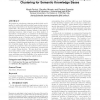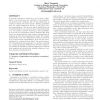13 search results - page 2 / 3 » Constructive induction and genetic algorithms for learning c... |
AAAI
1996
13 years 6 months ago
1996
Procedural representations of control policies have two advantages when facing the scale-up problem in learning tasks. First they are implicit, with potential for inductive genera...
CIKM
2007
Springer
13 years 11 months ago
2007
Springer
We present an evolutionary clustering method which can be applied to multi-relational knowledge bases storing resource annotations expressed in the standard languages for the Sema...
GECCO
2005
Springer
13 years 11 months ago
2005
Springer
A powerful approach to search is to try to learn a distribution of good solutions (in particular of the dependencies between their variables) and use this distribution as a basis ...
AGENTS
1999
Springer
13 years 9 months ago
1999
Springer
Most work on intelligent information agents has thus far focused on systems that are accessible through the World Wide Web. As demanding schedules prohibit people from continuous ...
GPEM
2008
13 years 5 months ago
2008
In this work a cooperative, bid-based, model for problem decomposition is proposed with application to discrete action domains such as classification. This represents a significan...


